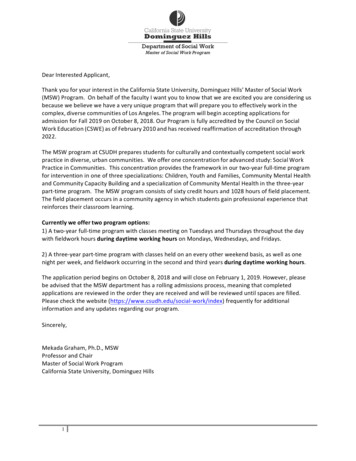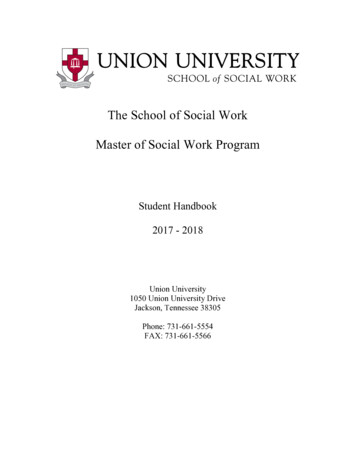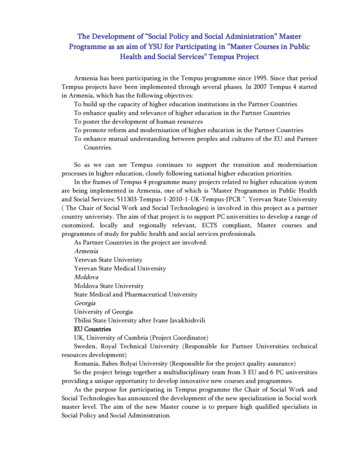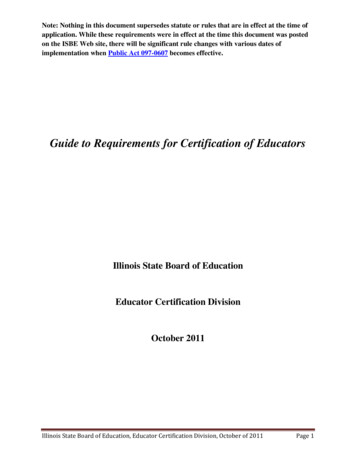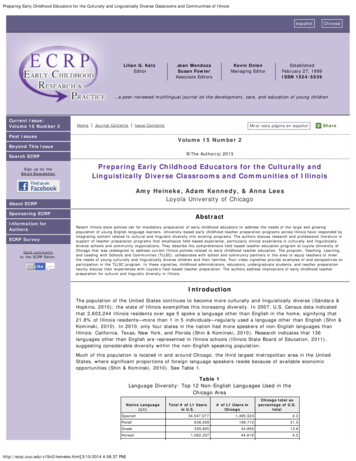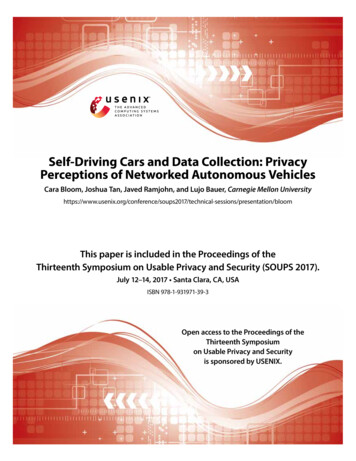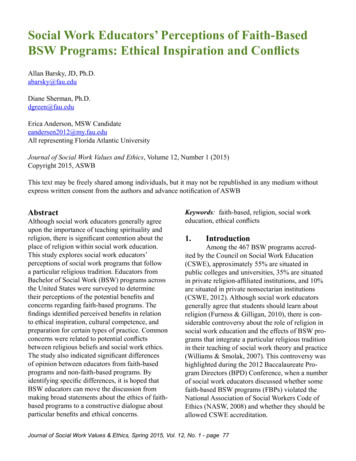
Transcription
Social Work Educators’ Perceptions of Faith-BasedBSW Programs: Ethical Inspiration and ConflictsAllan Barsky, JD, Ph.D.abarsky@fau.eduDiane Sherman, Ph.D.dgreen@fau.eduErica Anderson, MSW Candidateeandersen2012@my.fau.eduAll representing Florida Atlantic UniversityJournal of Social Work Values and Ethics, Volume 12, Number 1 (2015)Copyright 2015, ASWBThis text may be freely shared among individuals, but it may not be republished in any medium withoutexpress written consent from the authors and advance notification of ASWBAbstractAlthough social work educators generally agreeupon the importance of teaching spirituality andreligion, there is significant contention about theplace of religion within social work education.This study explores social work educators’perceptions of social work programs that followa particular religious tradition. Educators fromBachelor of Social Work (BSW) programs acrossthe United States were surveyed to determinetheir perceptions of the potential benefits andconcerns regarding faith-based programs. Thefindings identified perceived benefits in relationto ethical inspiration, cultural competence, andpreparation for certain types of practice. Commonconcerns were related to potential conflictsbetween religious beliefs and social work ethics.The study also indicated significant differencesof opinion between educators from faith-basedprograms and non-faith-based programs. Byidentifying specific differences, it is hoped thatBSW educators can move the discussion frommaking broad statements about the ethics of faithbased programs to a constructive dialogue aboutparticular benefits and ethical concerns.Keywords: faith-based, religion, social workeducation, ethical conflicts1.IntroductionAmong the 467 BSW programs accredited by the Council on Social Work Education(CSWE), approximately 55% are situated inpublic colleges and universities, 35% are situatedin private religion-affiliated institutions, and 10%are situated in private nonsectarian institutions(CSWE, 2012). Although social work educatorsgenerally agree that students should learn aboutreligion (Furness & Gilligan, 2010), there is considerable controversy about the role of religion insocial work education and the effects of BSW programs that integrate a particular religious traditionin their teaching of social work theory and practice(Williams & Smolak, 2007). This controversy washighlighted during the 2012 Baccalaureate Program Directors (BPD) Conference, when a numberof social work educators discussed whether somefaith-based BSW programs (FBPs) violated theNational Association of Social Workers Code ofEthics (NASW, 2008) and whether they should beallowed CSWE accreditation.Journal of Social Work Values & Ethics, Spring 2015, Vol. 12, No. 1 - page 77
Social Work Educators’ Perceptions of Faith-Based BSW Programs: Ethical Inspiration and ConflictsThe purpose of this survey research is toexplore the perceived benefits and concerns regarding the role of spirituality and religion in thesocial work curriculum. The information gleanedfrom this study can be used to facilitate a better understanding of the views of educators fromvarious types of institutions, and to encourage civildialogue about the place of religion in social workeducation.2.Literature Review2.1Definitional frameworkTo foster understanding of the place or roleof religion in social work education, it is important to define religion as well as related terms suchas faith, spirituality, and sectarian. This literaturereview begins with a definitional framework followed by a discussion of ways that religion hasbeen incorporated into social work programs thatfollow a particular religious tradition.Although spirituality, religion, faith, andsectarian are related concepts, each term has adistinct meaning. Spirituality refers to a search formeaning or process of transcendence beyond thematerial world. Spirituality may be experiencedthrough relationships with self, others, a higherpower, or the cosmos (Barker, 2007). Religion is aparticular form of spirituality in which there is anorganizational structure that provides social order,rituals, language, and shared understanding (Ai,2002; Canda & Furman, 2009). Whereas spirituality may be experienced individually or with others,religion is experienced within a communal system (Van Wormer, 2010). Faith refers to a beliefand trust in a higher power (Williams & Smolak,2007). Thus faith is an integral aspect of religion.Sectarian refers to an affiliation with a particulargroup and is often used to describe affiliation witha particular religious group. Nonsectarian refers toinstitutions that are not affiliated with a particularreligious group. For the purposes of this article, theterm faith-based BSW programs (FBPs) is used todescribe programs that integrate the values, beliefs, and traditions of a particular religion in theirimplicit and explicit curricula.Annual statistics gathered by CSWE(2012) suggest 35% of social work programs areunder the auspices of “private-religion-affiliatedinstitutions.” Although these 184 BSW programsare grouped together because of their institutions’religious affiliation, the roles of religion amongthese BSW programs may differ greatly. In someBSW programs, the social work department maybe situated in a religiously affiliated college oruniversity, but the program does not integrate theteachings and beliefs of a particular religion intothe curriculum (Cecil and Stoltzfus, 2007). In others, the program may follow a particular religioustradition. In yet others, the program may followa general religious tradition but it is not limitedto a particular branch of the religion (e.g., Christian, rather than Baptist or Presbyterian). Thisstudy asked research participants for their viewson social work programs that “follow a particularreligious tradition.” The rationale was to focusparticipants on the perceived benefits and concernsregarding programs that purposefully integrate aparticular religious tradition in their curriculumand teaching.2.2Faith-based programsWhile there is broad consensus among social work educators that BSW programs should include content on religion and spirituality (CSWE,2008, Policy 2.1.4), there is significant differenceof opinion about whether social work programsshould integrate the tenets and traditions of a particular religion (Cnaan, Boddie, & Danzig, 2005).This section describes various approaches to faithbased programs as well as perceived benefits andconcerns identified in the literature.Some educators in FBPs suggest that incorporating religious teaching is intended to strengthen the social justice content of social work education (NASW, 2008, Standard 6.04). For instance,Brenden and Shank (2012) suggest that Catholicsocial teaching inspires students to fulfill socialwork values related to and respect for the dignityand worth of all people. Catholic social teachingprovides students with a particular framework fordefining social justice, which includes focus on theJournal of Social Work Values & Ethics, Spring 2015, Vol. 12, No. 1 - page 78
Social Work Educators’ Perceptions of Faith-Based BSW Programs: Ethical Inspiration and Conflictscommon good and ensuring that the needs of themost vulnerable people in society are protected.Catholic social teaching suggests that governmenthas a positive moral function. It also suggests thatall Catholics have a stewardship role over God’screations. Cecil and Stoltzfus (2007) note thatvarious branches of Christianity fit well with socialwork given their focus on resolving social injustice and other forms of human suffering. From theorigins of social work in the 1800s to the currenttime, religion has acted as an inspiration for socialwork, including social advocacy (Barker, 2007;Netting, Thibault, & Ellor, 1990).Among proponents of integrating faith insocial work education, some believe that integration should be explicit and formal, using an explicitstyle. Others believe that the integration should bemore implicit and subtle, using a demonstrationstyle (Cecil & Stoltzfus, 2007). Educators using explicit approaches clearly identify that they are bringing the tenets, beliefs, rituals, worldview, and teachings of a particular religion into the teaching andlearning processes (Scales & Kelly, 2008). Demonstrationists model and communicate the underlyingvalues, beliefs, and teachings of the religion, butthey do not identify these factors as particular totheir own religion. Faith guides their teaching, eventhough they do not explicitly link their teaching tothe Gospel or other religious scriptures.Viewing social work as a vocation orspiritual calling, Sherr (2010) adopts an explicitapproach:I want [my BSW students] preparedand committed to their relationship toGod, themselves, and others, and committed to the diligence it takes to becompetent professionals to respond tothe problems of the world that preventevery human being from living in rightrelationships. (p. 23)In one of the most comprehensive bookson Christian-based social work education, Sherridentifies seven core commitments for Christianeducators:1. Developing and maintaining athorough knowledge of Scripture;2. Living an active and consistentChristian life;3. Spending time and energy gettingto know students;4. Supporting students while expecting academic excellence and challenging beliefs;5. Having expertise and experiencein one’s curriculum areas of socialwork education;6. Specifically integrating faith andlearning experiences with curriculum material; and7. Developing a classroom environment where students feel a sense ofbelonging and acceptance. (p. 18)Given these commitments, Sherr (2010)suggests that educators should model Christianityinside and outside of class. He further suggests thateducators should engage students in prayer, thestudy of scripture, and devotionals (inspirationalreadings). According to this framework, Christianvalues and beliefs are integrated into class discussions, assignments, role-plays, and field education.One of the suggested advantages of an explicitapproach is that students and professors feel free toexpress their faith more freely (Cecil & Stoltzfus,2007).A demonstrationist integrates religion without specifically identifying the specific religiousbasis (Cecil & Stoltzfus, 2007). An educator canpromote charity, good will, respect, and a commitment to social justice without referring to particular religious scriptures. An educator can modelthe teachings of Jesus, Moses, Buddha, Mohammed, or other religious figures without explicitlyidentifying them. Some educators who adopt ademonstrationist approach may be responding toconcerns that incorporating religion more explicitly would be tantamount to sectarian indoctrination (Williams & Smolak, 2007). Others may beconcerned that expressing religious beliefs mightJournal of Social Work Values & Ethics, Spring 2015, Vol. 12, No. 1 - page 79
Social Work Educators’ Perceptions of Faith-Based BSW Programs: Ethical Inspiration and Conflictsbe frowned upon by colleagues who perceivereligion as contrary to the scientific and humanisticunderpinnings of professional social work (Cnaan,Boddie, & Danzig, 2005).In a qualitative study of students inChristian-based social work programs, Sherr, Huff,& Curran (2006) identified the following “salientindicators” of integrating faith and learning: Faculty relationships with God (i.e.,faculty that demonstrated passion fortheir relationship with Jesus Christ, acommitment to develop that relationship over time, and a sense of accountability to the Lord) Faculty relationships with students(expressing sincere concern for students including spiritual, emotional,and physical well-being) Faculty competence in integratingfaith and learning (using Scripture asa primary base of reference, assigningstudents in applying Christian beliefsin different settings, sharing personalfaith integration experiences, and educating and confirming beliefs in absolute truths while also teaching studentsto appreciate diversity and differentideological views) Fostering a safe environment for theclassroom (creating a culture that elicits feelings of belonging, acceptance,and commitment)Although there is no research on whichfaith-based or faith-informed interventions arebeing taught in FBPs, Sheridan and Amato-vonHemert (1999) and Gilligan and Furness (2006)identified the following religiously sensitive interventions as being prevalent: gathered informationabout clients’ religious or spiritual backgrounds;used or recommended spiritual books or writings;prayed privately for clients; prayed or meditatedwith clients; used religious or spiritual languageor concepts; helped clients clarify their religiousor spiritual values; recommended participation ina religious or spiritual program; referred clientsto religious or spiritual counselors; helped clientsdevelop rituals as an intervention; participatedin clients’ rituals; shared worker’s own religiousor spiritual views or beliefs; recommended religious or spiritual forgiveness, penance or amends;performed exorcism or touched clients for healing purposes. Although the authors of both studies agree that religion should be covered in socialwork education, they also note there is significantdebate about the content of what is taught, including which types of interventions.Proponents of integrating faith and socialwork education suggest that faith-specific education prepares students for work in faith-basedagencies (Cnaan, Boddie, & Danzig, 2005; Crisp,2011). FBPs may attract students who want towork in faith-based agencies or who have prioraffiliations with such agencies (Freeman, 2007).FBPs may provide students with a more in-deptheducation about the culture, religious beliefs, andvalues of those who come from the same religiousbackground as that being taught in the program.While some FBPs focus on a particular religiousbackground, proponents suggest that faith-basededucation also sensitizes students to the needs andconcerns of people from all faith backgrounds(Streets, 2009). Proponents question whethersecular social work programs devalue the importance of religion or make it difficult for students todiscuss religion in their classes and assignments(Hodge, 2002; Sherr, 2010).Some social work educators suggest thatsocial work students should learn about clients’experiences of religion, but they should not bestudying religion per se (Williams & Smolak,2007). A primary concern raised by critics of FBPsis the potential conflict between religious values and beliefs and social work ethics. Religiousvalues and beliefs may conflict with social workethics in situations related to abortion, gay andlesbian clients, divorce, contraception, end-of-lifedecisions, and women’s rights (Cnaan, Boddie,& Danzig, 2005; Sheridan, Wilmer, & Atcheson,1994). Some educators question whether faithbased education encourages students to placeJournal of Social Work Values & Ethics, Spring 2015, Vol. 12, No. 1 - page 80
Social Work Educators’ Perceptions of Faith-Based BSW Programs: Ethical Inspiration and Conflictstheir own religious beliefs over their professionalobligations to clients. To impose religious beliefson clients, however well intended, violates a client’s rights to self-determination (Reamer, 2013,NASW, 2008, Standard 1.02). Some educators alsoquestion whether the focus on one religious tradition means that students will devalue the beliefs,values, traditions, or morals of people from different faith traditions and people who do not affiliatewith any religion (Clark & Amato von-Hemert,1994). If the teachings of a religion favor somegroups or devalue others, faith-based educationmay conflict with ethical standards pertaining todiscrimination and social justice (NASW, 2008,Standards 4.02 & 6.04(d)). Some educators areparticularly concerned about social workers whoembrace conservative or fundamentalist religions.Their concern is that such religions promote rigidthinking and a chauvinistic attitude toward peoplewho do not share their religious beliefs or followtheir teachings (Hunter, 2010). Some educatorssuggest that a pluralistic approach to incorporating religion may show the unique contributions ofvarious religions to social work policy and practice(Netting, Thibault, & Ellor, 1990).Educators who favor a secular approachmay be concerned that FBPs encourage proselytizing and other professional boundary violations(NASW, 2008, Standard 1.06(b)). The concernseems to be that if social work educators pray,study religious texts, and apply religious teachingsto practice, they are modeling similar practices forstudents to practice with clients. Some educatorsare concerned that a faith-based approach to socialwork goes against the principles of evidence-basedpractice, as professional decisions would be basedon religious beliefs rather than empirical evidence(Jimenez, 2006). Social workers have an ethicalduty to promote effective services (NASW, 2008,Standard 3.09(b)). Accordingly, educators shouldteach students to use critical thinking and science(rather than faith and religion) to determine thebest services or interventions for a particular client(Cecil & Stotzfus, 2007). Advocates of secular social work education are not necessarily opposed toproviding students with a better understanding ofreligion. In fact, content on religion may be seen asa vital component of cultural competence (NASW,2008, Standard 1.05(c); Streets, 2009).As the forgoing discussion indicates, socialwork educators have diverse views on what faithbased education means. They also possess diverseviews on the perceived benefits and concerns aboutfaith-based education. Although existing literatureidentifies a range of these perceived benefits andconcerns, no prior studies have identified the extent to which educators hold each of these views.This survey research was designed to fill this gapin the literature by exploring social work educators’ perceptions of social work programs thatfollow a particular religious tradition.3.MethodThe authors developed an online surveybased on their review of the benefits and concernsexpressed in prior literature on the place of religionin social work education. The survey consisted of14 closed-ended (Likert-type) questions. The questions solicited participants’ demographic information and views about the benefits and concernsregarding BSW programs that followed a particularreligious tradition. Among the 210 completed surveys from educators at BSW programs, the majority of respondents (n 151, 71.9%) identified asworking at institutions that are not faith-based. Theremainder of respondents identified as working atfaith-based institutions (n 59, 28.1%).The study population included educatorsfrom Bachelor of Social Work programs across theUnited States. The authors emailed invitations to the1500-member listserv of the Association of Baccalaureate Social Work Program Directors (BPD). Thesurvey and consent form were approved by FloridaAtlantic University’s human subjects committee (Institutional Review Board). No social work programswere excluded from participating in the study. Theconsent form explained the nature of the study, therisks and benefits, time commitment to participate,the voluntariness of participation, and anonymityof responses. Recipients of the consent form wereinvited to indicate their acceptance of the terms ofresearch by clicking a web-link to the survey.Journal of Social Work Values & Ethics, Spring 2015, Vol. 12, No. 1 - page 81
Social Work Educators’ Perceptions of Faith-Based BSW Programs: Ethical Inspiration and ConflictsData analysis included descriptive statistics, including frequency distributions comparingthe responses of participants from faith-based andnon-faith-based programs. Chi square analysis wasused to explore possible differences in responsesbetween these two groups (Grinnell & Unrau,2013).4.FindingsItem frequencies for the 14 closed-endedquestions are pre
dgreen@fau.edu Erica Anderson, MSW Candidate eandersen2012@my.fau.edu All representing Florida Atlantic University Journal of Social Work Values and Ethics, Volume 12, Number 1 (2015) . ers, the program may follow a particular religious tradition. I
